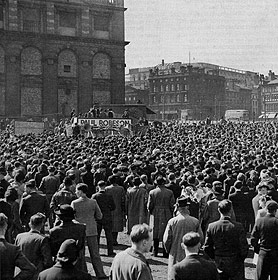
| HOME |
| NERVE |
| REVIEWS |
| ARCHIVE |
| EVENTS |
| LINKS |
| ABOUT US |
| CONTRIBUTORS |
| BACK ISSUES |
| CONTACT US |
Back to index of Nerve 11 - Winter 2007
 May '49
Rumblings in Liverpool One
May '49
Rumblings in Liverpool One
By Tayo Aluko
On Saturday 7th May 1949, without much preplanning, an impromptu outdoor concert was given by Paul Robeson at the blitzed site at Lord Street, Liverpool. The idea was floated on the morning the singer and actor was due to travel from Manchester to Liverpool on the next leg of his British concert tour. By the afternoon, it is estimated that about 10,000 people had turned up at Lord Street to hear Robeson sing songs like "Joshua Fit de Battle ob Jericho" from the top of a truck, accompanied by one of Liverpool's finest pianists on a piano mounted on a cart.¹
How come this African American could draw such a huge crowd at the drop of a hat, in a provincial city in a land foreign to him? He had last been in Britain ten years before, yet was able to sell out the Royal Albert Hall, the Philharmonic Hall and similar venues around the country again this time around. He also sang at cinemas for a shilling and outdoors for free, so that "the working people" could also enjoy his voice - hence the thousands at Lord Street that afternoon.
The problem with Robeson, though, was that he was a radical who would also speak his mind on occasions like this. Only the previous month in Paris, he had made a speech in which he said that it was "… unthinkable … that black Americans would wage … war … on behalf of those who had oppressed them for generations … against the Soviet Union who had raised non-whites to full human dignity in one generation." ² He wasn't afraid to attack Britain either. In a speech in New York in 1946 he had said, "A day or two ago, the British Foreign Minister said, … 'If we do not want to have total war, we must have total peace.' For once, I agree with him. But he must be totally blind if he cannot see that the absence of peace in the world today is due precisely to the efforts of the British, American and other imperialist powers to retain their control over the peoples of Asia, the Middle East, Europe and Africa." ³ It is interesting how uncannily and poignantly contemporary Robeson's words sound sixty years later.
If the good working people of Liverpool cheered him at Lord Street, it is conceivable that much of the British establishment would have cheered his reception back home in America a few months later, when a riot broke out at a park in Peekskill, upstate New York, preventing him from holding an outdoor concert in support of the Harlem Chapter of the Civil Rights Congress. His Paris speech had been reported in such a way that by the time he got back home, he had been branded "Un-American", and a shameless traitor to his country. He would not be silenced, and he successfully staged a return concert the following month, with protection from trade unionists from around the country.
This show of defiance didn't improve his prospects though, and for the next nine years he was prevented from travelling out of America, or even performing much at home. It was one thing for a black man to be allowed fame and fortune, in pre-civil rights America, for singing "Ol' Man River", the very patriotic "Ballad for Americans", and of course, plantation songs and Negro Spirituals. But to talk to European audiences about the oppression of black Americans, the futility of war against the Soviet Union, or the liberation of colonial peoples of Africa and Asia? This at a time when Martin Luther King and Malcolm X were just entering their twenties and discovering religion: King at a Christian seminary in Philadelphia, and Malcolm, recently converted to Islam in a Massachusetts prison while serving time for burglary. Their political maturity was still some way off, and it is therefore with some justification that Robeson is often referred to as the Great forerunner to the Civil Rights Movement.
The Lord Street site was redeveloped in the 1950s and 60s, but another blitz has occurred there recently: Liverpool One - the massive Grosvenor retail development taking shape there, in another apparent manifestation of the triumph of the capitalist system over the socialism that Robeson championed.
As curious movements in the world banking system begin to indicate possible faults in its foundations, it is certain that if Robeson were alive today, his bass voice would be leading a loud chorus, rising up from underground, refusing to be silenced, in a continued effort to force those walls of inequality to "come a-tumblin' down".
Tayo is an architect in Liverpool, and also sings. He also performs a play he has written titled Call Mr Robeson.
1. Liverpool Daily Post, Monday, May 9, 1949. The occasion was also described
in "Paul Robeson, Artist and Activist On Records, Radio and Television"
written and published by Allan Lord Thompson, 2004, pX.16 (Aug 2001).
2. Paul Robeson Jnr. quoted in Thompson, pX.19.c
3. "Paul Robeson Speaks" by Philip S Foner. Quartet, London,
1978, p170